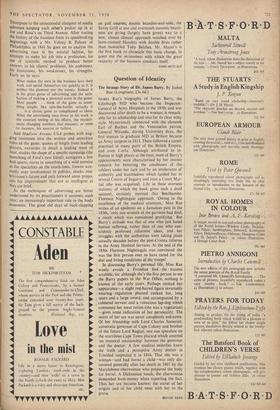Question of Identity The Strange Story of Dr.. James . Barry.
By Isobel Rae. (Longmans, 13s. 6d.) ISOBEL RAE'S biography of James Barry, the Edinburgh MD who became the Inspector- General 'of Army H'ospitals in the 1850s and was discovered after death to be a woman, is remark- able for its scholarship and also for its clear witty style. Mysteriously connected with the eleventh Earl of Buchan and the Venezuelan patriot, General M iranda, during University days, the first woman to graduate MD in Britain became an Army surgeon in 1813. There followed a career practised in many parts of the British Empire, and even Corfu. Although attributed to in- fluence in high places at the time, most of Barry's appointments were characterised by her intense concern for bettering the conditions of the soldiers under her card and by an intolerance of authority and bumbledom which landed her in several Courts of Inquiry and even a Court Mar- tial (she was acquitted). Life in these overseas stations, of which the book gives such a droll account, certainly merited this Benthamite- Florence Nightingale approach. 'Owing to the excellence of the medical attention,' Miss Rae writes of an epidemic on a Jamaican post in the 1830s, 'only one-seventh of the garrison had died, a result which was considered gratifying.' But Barry's attitude was that of one who just hated human suffering, rather than of one who con- sciously professed reformist ideas, and her struggles with the authorities were taking place actually decades before the post-Crimea reforms in the Army Medical Services. At the end of the 1850s Florence Nightingale was convinced she was the first person ever to have cared for the diet, and, living conditions of the troops!
In discussing Barry's personal life, Miss Rae wisely avoids a Freudian find - the - trauma scrabble, for although she's the first person to see the Barry papers in the War Office, nothing is known of the early years; Perhaps instead her appearance—a slight red-haired figure invariably wearing regulation plumed cocked hat, long spurs and a large sword, and accompanied by a coloured servant and a voracious lap-dog which consumed her meat ration (she was a vegetarian) —gives some indication of her personality. The secret of her sex was never completely unknown. Of her friendship with Lord Charles Somerset, autocratic governor of Cape Colony and brother of the future Lord Raglan, one can speculate on the scurrilous Cape Town placard which asserted an immoral relationship' between the governor and the doctor. A few medical orderlies knew the truth and a perceptive Army doctor in Trinidad suspected it in 1844. That she was a woman—and had borne a child—was only dis- covered generally after her death in 1865 by the Marylebone charwoman who prepared the body for burial. A Dickensian touch, the charwoman demanded hush-money when reporting the fact. 'Thus her sex became known; the secret of her origins and of her child went with her to the grave.
DAVID REES














































































 Previous page
Previous page